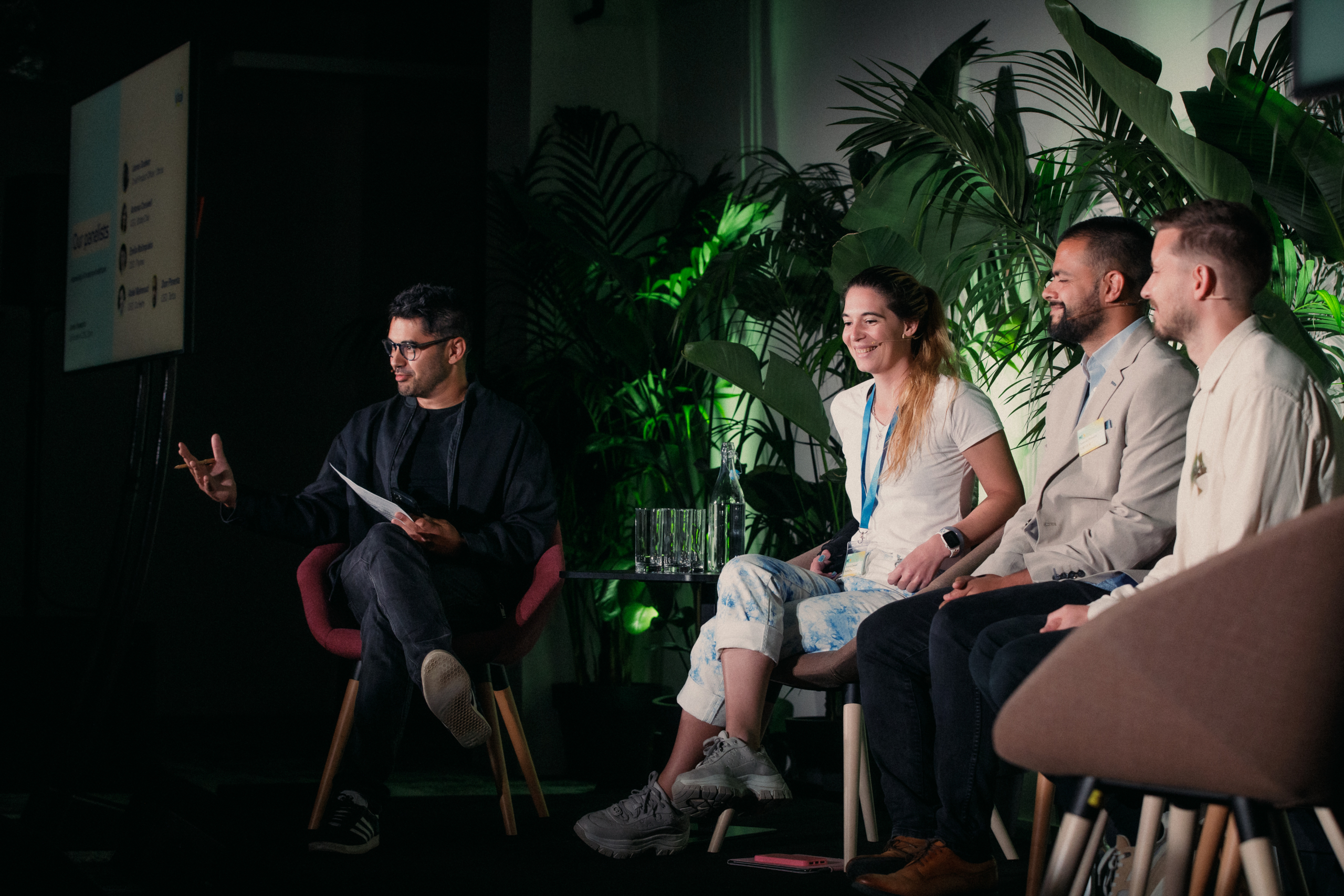How to become a “VC” (and why it took me so long!)
The main reason I receive a cold email is, of course, because a start-up is looking for funding. The second biggest reason people reach out is because they’re interested in starting a career in VC.
When I receive these emails, my heart sinks a little. I know what it’s like to want to work in the sector, and I also know how hard it can be to get into. I first learned about the career of a VC some 17 years ago – and I knew immediately it’s what I wanted to do. But it still took me over a decade to make it happen.
In this blog I’m going to share my thoughts on the subject, offer up some hopefully helpful hints and tips, and talk about part of my journey. I’m fairly certain it has been the right career for me. Indeed, other than professional sportsman (any sport!) or world-famous rockstar (any band!) I can’t think of anything I’d rather be doing. But I’m not sure it’s right for everyone. So, the first thing to do is to ask: ‘is a job as an investor definitely the one for me?’
A note of caution
There’s no doubt that working as an early-stage investor is exciting and interesting. You spend your days with incredible entrepreneurs – risk takers, eternal optimists building incredible businesses with the genuine belief that they will change the world. You never stop learning, becoming an overnight expert in a staggering variety of subjects, that means not only are you never bored – you always have some great conversation to bring to a dinner party.
But on the other side of things, the nature of the job means you see a lot of opportunities, and you really must be OK with saying… no. A lot . For context, you might complete 1 in 100 or 200 deals you see.
If you want to work in VC, you need to be prepared to operate at a relentlessly fast pace, juggling loads of different priorities simultaneously. You must be okay with having frank and honest conversations with both colleagues and founders, often with differing opinions to your own that can ultimately decide the future of their company. And finally, you need to appreciate that you may lose money; both yours and your investors’.
A quick anecdote on the subject. Whilst I was gloating about a recent successful investment, an old boss once said to me: “Never believe you’re an alchemist. I’ve learnt it’s better to treat investment success and failure as imposters just the same”. While I’m pretty sure he nicked that last bit from Kipling, it certainly holds true, and in time I learned that losing money feels really, really bad. Just another important reason for taking great care of investors’ money
I say none of this to dissuade anyone, but instead to share the full journey of the VC – warts and all – rather than simply focussing on the part where you manage to invest in a unicorn (I’m still waiting for that one).
If after reading the above you still think it’s for you, then the world of VC can be a wonderful, varied, exciting and stimulating career.
Getting started
So where do you start?
First, it’s important to acknowledge that VCs aren’t homogeneous, and generalist funds are becoming fewer and fewer. In the old days, the archetypal VC was an investment banker who had traded his (deliberate use of the male pronoun) suit and tie in for a Patagonia gilet (there are still lots of these chaps about). But thankfully the industry is maturing, and as funds specialise they are hiring relative to those specialisms. If you want to join our fintech team, for example, there’s no doubt you’ll need to demonstrate a passion for and experience in the world of fintech. If you’re looking to join the deep tech team, chances are you’ll have a PhD in something only comprehensible to a select few.
This focus on specialism applies more at the earlier the stage of investment. But if you’re interested in the growth stage of VC investing (backing companies with a greater and deeper history), you’ll need to prove your financial analytics skills; if you aren’t competent with the core financials of business, it’s going to be hard to enter the world of growth VC. You might be better choosing a specialism that excites you and diving deeper into that.
Next steps
Once you’ve decided you want to be an early-stage health tech investor, or a growth B2B software investor (like me), then what?
First: be tenacious and persevere. It’s highly unlikely you’ll get the first job you apply for. We regularly receive more than 300 applications for every Associate role we post for. We’re looking for specific things, but what might not be right for us could be perfect for another VC.
Those who get the job tend to have a few things in common. They will often have immersed themselves in the relevant ecosystem, and can articulate what excites them about the sector, and the areas they believe to be most interesting for investment. They might, like me, have become involved in their friends’ start ups, or created a small start up on the side of their main job.
It’s much less likely that they will have come directly from a corporate job into a VC role without any previous interest or activity in early-stage VC investing. This experience is essential – but it could be anything, from working with earlier stage incubators as a volunteer, to becoming a renowned blogger on a particular sector.
And if you’ve tried that?
I often tell people struggling to crack VC that the next best step is to join a start up within the ecosystem that compels them. If you’re desperate to be a VC in consumer tech, finding a key role in a young start up, and helping to build a business in that space, will prove that you can talk the same language as founders, and have something to offer to them when you move into your VC career. If you can do it multiple times, whilst also attending relevant VC events and conferences, all the better. I spent almost four years at a start up as the first employee, and many of the learnings I pass on to my portfolio companies still come from that time.
MBA or MB-Nay?
The question of what the ’right’ qualifications to be a VC are is a tricky one to answer. People with prior experience in a corporate role often look to an MBA to help them make the move across into VC. I’ve read many blog posts that delight in calling it a waste of time, and have even heard a few in the sector say the same thing, but I disagree. I undertook an MBA, and it gave me the confidence to be a VC – and the tools to learn more about the ecosystem. An MBA doesn’t offer a steppingstone directly into VC, but what it will do, if you embrace it, is give you opportunities to get involved in relevant projects. Often MBAs also have seed funds and networks in the industry.
Not a straight line
One thing about a career in VC is certain: the journey isn’t linear. Almost everyone I know in VC has a slightly different story, but one thing is consistent: it took real persistence, and often some very good fortune. For me, it meant starting my career multiple times over. Often this was at the cost of a higher salary and more senior operational position. But I knew that was the ladder I wanted to climb.
What I look for when recruiting
As a final thought, I wanted to share what I look for when reviewing CVs for Associate positions. As a growth investor in the B2B software space, we need to see some demonstration of financial analytical skills. Aside from people already working in an investing role, often this will be as an advisor or consultant to tech companies seeking investment, or someone working on the fundraising side of a fast-growing tech business. If I find that, I start looking for a reason the candidate has shown an interest in earlier stage investing. Do they talk about mentorship of small companies, or mention events they’ve attended? Might they even have tried to start their own venture? I’m looking for things that set them apart, and make their CV stand out from the pile. I’m also looking for anything they might bring to the team that we don’t already have, such as a language, or specific specialism. Finally, I like to get an idea on who they are; given Octopus’ B-Corp credentials it’s great to see examples of how that person has given back through charity or non-work related clubs.
If you’re looking for a job in VC, then please do keep an eye on our job boards at Octopus Ventures or sign up to our newsletter. We update it on a regular basis, as there are always new positions becoming available.
Scroll down for some further reading on the subject – and I hope this has been helpful! If the qualities and experience I’ve described sound like you, please do apply.
Further reading
Playing “fake VC” (or the portfolio approach to getting a job in venture capital)














